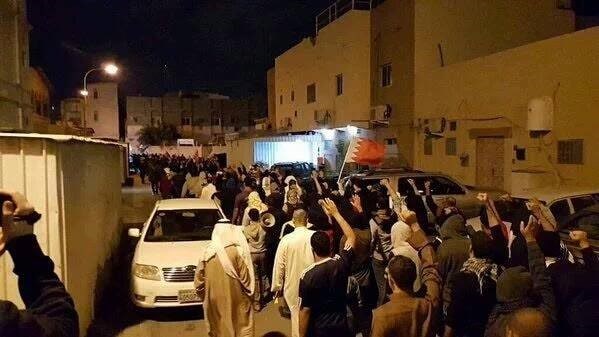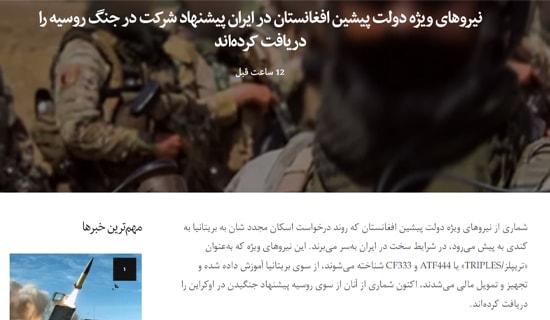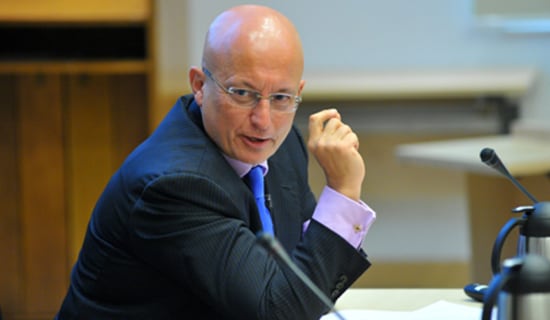On January 2, 2016, Saudi Arabia's interior ministry announced that the kingdom had executed 47 individuals,[1] Sunni and Shi'ite, on various charges, including carrying out terrorist operations and inciting to terrorism; espousing takfiri ideology; attacking the military and security apparatuses; killing security officers and civilians; and acting to undermine Saudi Arabia's economy, standing, interests and its relations with "sister and ally countries."[2] Of those executed, 43 were Sunnis, members of an Al-Qaeda-affiliated group that acted in the kingdom in 2003-2004, targeting the army and security apparatuses as well as oil facilities. The most prominent of the Sunnis was Fares Aal Showil, aka Al-Zahrani, considered to have been one of the group's leaders and chief ideologues.
The other four people executed were Shi'ites. The most prominent of them was oppositionist cleric Nimr Baqr Al-Nimr, one of the leaders of the Shi'ite protests in Saudi Arabia, known for his criticism of the Saudi regime and his support of Iran.[3] In 2012 he rejoiced in the death of then-crown prince Nayef bin Sa'ud bin 'Abd Al-'Aziz,[4] and in one of his sermons he explicitly declared his loyalty to Iran.[5] In July 2012 Al-Nimr was arrested in the Shi'ite city of Al-'Awamiyah, in the Al-Qatif region in eastern Saudi Arabia, on charges of inciting against the royal family and fomenting protest among the city's Shi'ite population. In October 2014 a Saudi court sentenced him to death for "igniting sectarian fitna" in the kingdom and disobeying the king with the aim of creating chaos and toppling the regime. Subsequently, the Saudi appellate court and the Supreme Court rejected Al-Nimr's appeal of the sentence.[6]

Sheikh Nimr Baqr Al-Nimr (Image: alalam.ir)
Saudi Mufti: The Executions Are Sanctioned By The Koran, Sunna
The Council of Senior Clerics, Saudi Arabia's top religious body, voiced its support for the executions, and its head, Saudi Mufti 'Abd Al-'Aziz bin 'Abdallah Aal Al-Sheikh, said that they were "based on the Koran and the Sunna." He added: "The sentences were according to the shari'a, and there is no doubt [regarding their validity], for these are the punishments set out in the Koran and they apply to everyone..." He also praised the independence and fairness of the Saudi judicial system, stressing that every capital case is reviewed by more than nine judges.[7]
Saudi Press: The Kingdom's Security Is A Red Line; This Was A Victory For Justice
The Saudi press also rallied to defend the executions, particularly that of Shi'ite sheikh Nimr Al-Nimr. Front-page headlines declared that justice had been done and the kingdom's security had been defended. Editorials in the government papers likewise claimed that the executions had been justified. They argued that national security was a "red line" and that terrorists who had killed innocent people deserved death; that all the verdicts and sentences were handed down after due process, which demonstrates the fairness of the Saudi judiciary; and that the execution of the 47 terrorists, both Sunnis and Shi'ites, was part of Saudi Arabia's war on terror, which "makes no distinctions of religion, sect or gender," since "everyone is equal before the judiciary and the law."[8]

"Justice Has Been
Done" (Al-Sharq, Saudi
Arabia, January 3, 2016)

"Justice Has Triumphed,
The Kingdom Is Safe" (Al-Riyadh,
Saudi Arabia, January 3, 2016)

Cartoon justifies the
executions with quote from the Koran (2:179): "In [this law of]
retribution there is life for you" (Al-Sharq, Saudi Arabia, January 3, 2016)
It is noteworthy that Saudi analysts and op-ed writers likewise expressed sweeping support for the executions. Tariq Al-Homayed, the former editor of the London-based Saudi daily Al-Sharq Al-Awsat, wrote that they were necessary in order to protect Saudi Arabia from extremists and terrorists who threatened its security. He noted that the accused had received a fair and protracted trial, while they themselves never granted their victims even a single hour to flee. He also stressed that Saudis should not heed the criticism of Iran and others, because Saudi Arabia's security was more important.[9] Journalist Daoud Al-Shiryan wrote in the London-based Saudi daily Al-Hayat that Al-Nimr was an "Iranian agent" and that "his plan was no different than that of Osama bin Laden."[10] Liberal journalist Mansour Al-Nuqidan justified the executions and called on Saudi Shi'ites to "help the authorities in keeping the adolescents and young people from falling into the abyss of terrorism and the furnace of political extremism."[11]

Report in 'Okaz
daily: 'There Will Be No Compromise Or Negligence When It Comes To Homeland
Security' (Okaz, Saudi Arabia, January 3, 2016)

Image in Al-Watan
daily shows Al-Nimr (right) and Aal Showil side by side, to demonstrate that
Saudi Arabia operates against both Shi'ite and Sunni terrorists (Al-Watan,
Saudi Arabia, January 3, 2016).
Saudi FM Announces Severing Of Diplomatic Ties With Iran
Al-Nimr's execution sparked a storm in the camp of Iran and its supporters, and senior Iranian officials, headed by Supreme Leader Ali Khamenei, strongly condemned the action and the Saudi regime, and even threatened revenge. Enraged Iranian demonstrators set fire to the Saudi Embassy in Tehran and rioted at the Saudi consulate in Mashhad in northern Iran.[12]

Rioters wreak havoc in Saudi
embassy in Tehran (Image: Facebook.com/Iran.Military, January 2, 2016)
In response to the Iranian statements, the Saudi Foreign Ministry issued an announcement condemning Iran, accusing it of supporting and harboring terrorists and of flagrantly intervening in the internal affairs of the region's countries and acting to destabilize them. The announcement said that "the statements of the Iranian regime expose its true [character], as expressed by [its] support for terror, and continue the policy of undermining the security and stability of the region's countries... By defending the actions of terrorists and justifying them, the Iranian regime becomes a partner to their crimes, and it bears full responsibility for its policy of incitement and escalation." It was further claimed that Iran harbored known terrorists for years and also financed and operated terror cells that were dispatched to the Gulf countries.[13] Subsequently, Saudi Arabia summoned the Iranian ambassador to Riyadh to protest the hostile statements by Iranian officials, and informed him that it viewed these statements as "a flagrant intervention in Saudi affairs".[14]

Iran, relying on the book of "Sectarianism"
that is printed in "Hell," is behind "the burning of the Saudi
embassy" (Al-Madina, Saudi
Arabia, January 4, 2016)
The tension in the relations peaked later than day when Saudi Foreign Minister 'Adel Al-Jubeir announced at a press conference that Saudi Arabia was severing diplomatic ties with Iran. Al-Jubeir explained that Saudi Arabia refused to work with a "terror-supporting state that spreads chaos and sectarianism throughout the Islamic world," and added: "We will not allow Iran to threaten our security and to assist those who threaten the region's stability."[15]

Tweet by the Saudi Foreign Minister: "The
aggressive policy of the Iranian regime against Saudi Arabia and the region is
a central reason for severing diplomatic ties with it"
(Twitter.com/AdelAlJubeir, January 4, 2016)
The tension was also expressed in acerbic editorials condemning Iran in the Saudi government press. For example, on January 4, 2016, 'Okaz editor Jamil Al-Ziabi published an article titled "Cutting Off the Serpent's Head," and the Al-Iqtisadiyya daily attacked Iran in an editorial headed "Iran Not Only Nurtures Terror But Creates It."

Saudi Arabia works to cut down terror while Iran cultivates
it (Al-Iqtisadiyya, Saudi Arabia,
January 3, 2015)
Gulf States Align With Saudi Arabia: The Executions A Crucial Measure In Defense Of Saudi Security
Many Sunni Arab states, including Jordan, Egypt, Sudan and Tunisia, hastened to side with Saudi Arabia and condemned the attack on the Saudi embassy in Tehran. Particularly noticeable in their support were the Gulf states, which hastened to defend Saudi Arabia's right to carry out the court's ruling as a punitive and deterrent measure.
The Secretary-General of the Gulf Cooperation Council (GCC), Dr. 'Abd Al-Latif bin Rashid Al-Zayani, issued an announcement in which he condemned the "barbaric attacks" on the Saudi embassy in Tehran and the Saudi consulate in Mashhad and placed full responsibility for these "terrorist actions" on the Iranian authorities. He claimed that Iran's failure to prevent them was a grave violation of its commitment to defend diplomatic representations in accordance with international law and the 1961 Vienna Convention on Diplomatic Relations. He condemned the "aggressive and inciting" Iranian statements regarding Saudi Arabia's execution of the terrorists, calling them a flagrant intervention in Saudi Arabia's internal affairs that had encouraged the attacks on the Saudi diplomatic representations. He declared that the GCC states stood with Saudi Arabia and emphasized their support for its decisions regarding the war on terror in all its forms and regarding the pursuit and prosecution of terrorists and fomenters of fitna and riots.[16]
In a similar vein, UAE Foreign Minister Sheikh 'Abdallah bin Zayed Aal Nahyan declared that his country "fully supported the sister [state] Saudi Arabia and the deterrent measures against terror and radicalism that it adopted as a clear message against terror and against those preaching fitna and riots in attempt to divide Saudi society and threaten it." He stated further that "carrying out the sentences handed down to the convicted individuals was Saudi Arabia's fundamental right after it was proven that they had committed the crimes, and a necessary measure to ensure the security of all members of the Saudi nation and all those residing on its soil."[17]
Likewise, in response to the attacks on the Saudi representations in Iran, the UAE summoned the Iranian ambassador to protest these attacks and "Iran's intervention in a sovereign Saudi affair."[18]

The hypocrisy of Iranian officials who protest
Al-Nimr's execution while hanging members of Iran's minorities: a
"Sunni," an "Ahwazi" and a "Baluchi" (Al-Arab, London, January 4, 2016)
Bahrain also expressed support for the Saudi measures and announced that it too was severing diplomatic ties with Iran.[19] The Bahraini ministry of the interior even threatened to punish anybody criticizing the executions. An announcement it issued said: "It is Saudi Arabia's right to adopt all the security measures that it sees fit to preserve security and stability in its territory. We will take all necessary legal measures against any infringement or negative response to [Saudi Arabia's] execution of the sentences, via an announcement or declaration, and will view this as incitement to fitna and schism and as a threat to public safety."[20]

Front page of Bahraini daily: "The Execution Of
The Sentences By Saudi Arabia - A Necessary Measure" (Akhbar Al-Khalij, Bahrain, January 3, 2016)
The Kuwaiti Foreign Ministry also condemned the attacks on the Saudi representations, saying that they constituted a violation of the 1961 Vienna Convention and stressing that the Iranian regime was responsible for the safety of the representations and their staff.[21]
The Qatari foreign ministry, too, issued a statement supporting Saudi Arabia's actions to address the threats it faces and condemning the attack on the Saudi embassy, calling it a "clear violation of international law and treaties" and charging the Iranian government protect all diplomatic representations and take firm measures against lawbreakers.[22]
The sweeping support for Saudi Arabia in the Gulf was also expressed in editorials in the official Gulf press. For example, the Qatari daily Al-Arab published an editorial titled "Support for Saudi Arabia Is an Anti-Sectarian Duty," which rejected the Iranian claim that Al-Nimr was executed for being a Shi'ite. The daily called to support "the big sister" Saudi Arabia and to "protect its internal unity from all biased sectarian calls, especially since Saudi Arabia's strength is in principle the strength of the [entire] Arab and Islamic world..."[23] An editorial in the Qatari daily Al-Raya claimed that this was an internal Saudi matter and no one had the right to intervene in it. The daily claimed further that "the executions were carried out as part of measures that Saudi Arabia is adopting to deter anyone threatening its security and the security of its people and residents... The Saudi judicial system makes no distinction between Sunnis and Shi'ites. It refers only to people, applying objective legal principles regardless of sectarian affiliation. Therefore, intervention and casting doubt upon the Saudi legal system is inappropriate..."[24]

Saudi Arabia fights terrorism (Al-Watan, Kuwait, January 2, 2016)
As for the position of Oman, which is also a member of the GCC but is known to be close to Iran, there were conflicting reports. At first, the Omani foreign minister was quoted as saying that Al-Nimr's execution did not benefit conditions in the region. However, the Omani foreign ministry hastened to deny this on its Twitter account, emphasizing that Oman supported the GCC and its stance on the Iranian attacks and that the initial report was baseless.

Omani foreign ministry's tweet (Twitter.com/MofaOman,
January 3, 2016)
Criticism By Shi'ites In The Gulf States
In contrast to their governments, Shi'ites in the Gulf condemned Sheikh Al-Nimr's execution, and protests, some of them violent, were held in the Shi'ite Al-Qatif province in eastern Saudi Arabia. Protestors chanted slogans against King Salman and Crown Prince Muhammad bin Nayef, whom they held directly responsible for the execution, and called to topple the Saudi regime, and carried banners with the slogans "Death to the Aal Saud [Family]" and "Death to America."[25]
Kuwaiti Shi'ite MP 'Adnan 'Abd Al-Samad described Al-Nimr's execution as "martyrdom" (istishhad) and warned that it would complicate the situation and provoke widespread responses, particularly since Al-Nimr preached a non-violent struggle.[26] In Bahrain, the Coalition of February 14 Youth, a Shi'ite opposition group that initiated the August 14, 2014 protests against the Bahraini regime, declared a general state of mourning commencing Sunday (January 3) and called for angry demonstrations throughout Bahrain. Demonstrations were indeed held in several locations, including in the Sitra peninsula, a Bahraini Shi'ite opposition stronghold, and the towns of Sanad and Al-Qadam.

Announcement calling for demonstrations
(Facebook.com/Coalition14th, January 2, 2016)

Demonstration in the town of Sitra following
Al-Nimr's execution (Facebook.com/Coalition14th,
January 2, 2016)
* E. Ezrahi is a research fellow at MEMRI; H. Varulkar is Director of Research at MEMRI.
Endnotes:
[1] According to the announcement, the executions were carried out in 12 provinces in Saudi Arabia. In four of them the convicted men were executed by firing squad and in the rest they were beheaded.
[2] Al-Iqtisadiyya (Saudi Arabia), January 2, 2016.
[3] Al-Iqtisadiyya (Saudi Arabia), January 2, 3, 2016; Al-Watan (Saudi Arabia), January 3, 2016.
[4] See MEMRI TV Clip No. 3483, Saudi Shiite Cleric Nimr Al-Nimr Rejoices in the Death of Saudi Crown Prince Nayef: "He Will Be Eaten by Worms and Suffer the Torments of Hell in His Grave", June 27, 2012.
[5] See MEMRI Inquiry & Analysis No. 482, Recent Rise in Sunni-Shi'ite Tension (Part III): Sectarian Strife in Saudi Arabia,
February 24, 2009.
[6] Al-Quds Al-Arabi (London), October 25, 2015.
[7] Al-Iqtisadiyya (Saudi Arabia), January 2, 2016, Okaz (Saudi Arabia), January 3, 2016.
[8] Al-Riyadh, Okaz (Saudi Arabia), January 3, 2016.
[9] Al-Sharq Al-Awsat (London), January 3, 2016.
[10] Al-Hayat (London), January 4, 2016.
[11] 'Okaz (Saudi Arabia), January 4, 2016.
[12] See MEMRI Special Dispatch No. 6152, Iran Furious Over Saudi Arabia's Execution Of Shi'ite Sheikh Nimr Al-Nimr
[13] Al-Riyadh (Saudi Arabia), January 3, 2016.
[14] Al-Iqtisadiyya (Saudi Arabia), January 2, 2016.
[15] Al-Iqtisadiyya (Saudi Arabia), January 3, 2016.
[16] Gcc-sg.org, January 3, 2016.
[17] WAM News Agency (UAE), January 2, 2016.
[18] Al-Sharq (Qatar), January 3, 2016.
[19] Alarabiya.net, January 4, 2016.
[20] Akhbar Al-Khalij (Bahrain), January 3, 2016.
[21] Al-Rai (Kuwait), January 3, 2016.
[22] Al-Sharq Al-Awsat (London), January 4, 2016.
[23] Al-Arab (Qatar), January 3, 2016.
[24] Al-Raya, (Qatar), January 3, 2016.
[25] Al-Akhbar (Lebanon), January 4, 2016. Videos of the protests were posted on social media. See: Facebook.com/waledfadhel/videos, facebook.com/mnbrar/videos, January 4, 2016.
[26] Al-Jarida (Kuwait), January 2, 2016.





